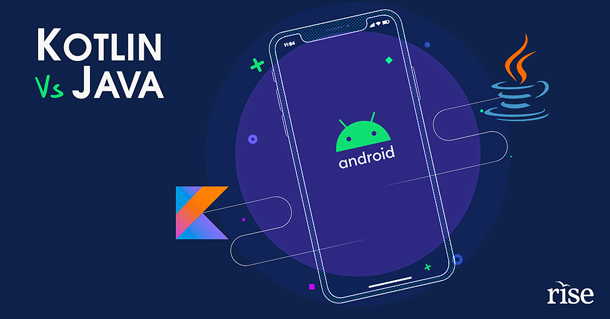

When it comes to developing mobile applications for business, Android is the preferred platform because of the peculiar features it offers. As a newbie in android development, the only language that you can think of is Java, and that is quite obvious because most of the Android apps are developed in Java. However, the rise of new languages might challenge the dominance of Java in enterprise application development. One such language is Kotlin, a statically typed, robust modern programming language developed by JetBrains in 2011.
Java is the first official language for Android development, and subsequently, the most used language as well. It is a platform-independent programming language that follows “Write Once, Read Anywhere” (WORA) concept. Whereas, Kotlin has definitely gained momentum after being announced as a second official language of Android app development by Google in 2017. It is based on Java Virtual Machine (JVM) just like C/ C++ and can be compiled to JavaScript in multiple ways. Kotlin was created with an aim to level up Java mobile app development by the addition of some advanced functional features.
As a beginner in the mobile app development world, you might be wondering about how Kotlin is different from Java; then this article is for you. Let’s dig a little deeper to know the differences between Java and Kotlin based on its features and functionalities.
Interoperable
Kotlin is fully interoperable with Java, which means it can run on Java Virtual Machine (JVM). It also supports all the existing Java tools, libraries, and frameworks.
Learning Curve
Kotlin is a general-purpose, open-source programming language. If you’re quite familiar with Java, learning Kotlin will be more comfortable. When it comes to syntax, Kotlin generates cleaner code, which makes it more readable and understandable.
Community
Kotlin has a relatively smaller developer community compared to Java, which means it has limited learning resources. Whereas, Java is a vast programming language with extensive open-source ecosystem support, which helps us to get solutions for the most challenging questions.
Null Pointer Exceptions
It is one of the most infuriating issues for Java developers. Java enables developers to assign null to any variable. When the programmers try to use an object reference with a null value, then they encounter the NullPointerException!
Whereas Kotlin contains built-in null safety support, which means all types are non-nullable by default. The NullPointer exception is majorly responsible for Android development errors. Android is generally based on Null to represent the absence of a value, but Kotlin’s in-built safety feature makes it win over Android and Java.
Compilation Time
Kotlin shows slower compilation speed compared to Java. Although it speeds Java in some instances, however, it is not recommended as a reliable platform for more significant projects.
Java apps are comparatively lighter and more compact than the Kotlin apps, which results in faster application experience.
No Checked Exceptions
Another significant difference between Kotlin and Java is the checked exception feature. Checked exceptions result when the compiler forces the caller of a function to catch during compile time. Kotlin removes checked exceptions entirely, which helps minimize verbosity and improve type safety. Whereas in Java, checked exception is a controversial feature that causes empty catch blocks.
We hope that this blog provided you with adequate insights into the differences between Java and Kotlin languages. Indeed both languages have their own advantages over the other. If you wish to fast track your career as an Android developer with either of the language, you must opt for an exclusively curated Android training course to align your career in the area of your interest.
We use cookies to deliver the best browsing experience as well as for analytics and marketing purposes. By continuing to browse this website, you accept the use of cookies. For more information, please visit our Privacy Policy